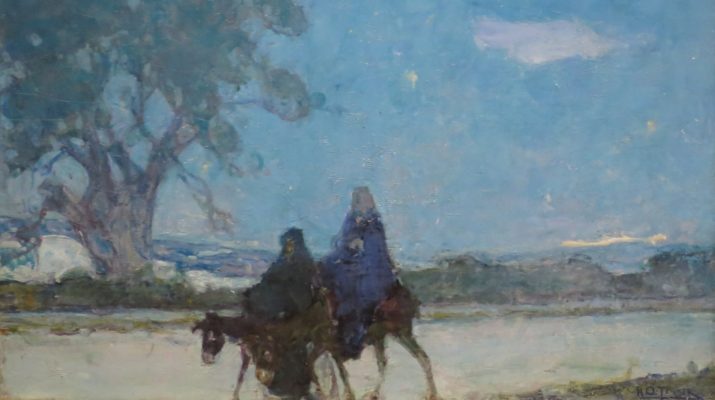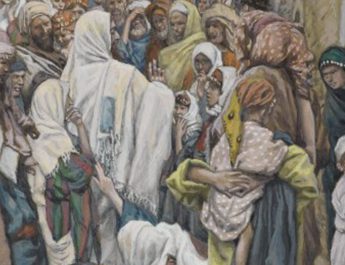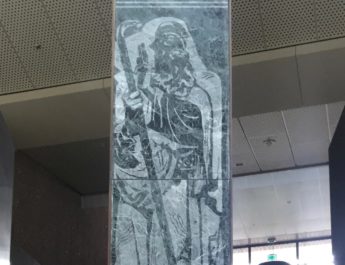Matthew 2:13-23
First Sunday after Christmas A
13 Now after they had left,A, B an angelC
A “left” = anachoreo. 14x in NT. From ana (up, again, back, among, anew) + choreo (to make space, receive, have room for, progress, depart so as to make room; figuratively, living open-heartedly); {from choros (a particular space or place); from chora (space, land, region, fields, open area); from chasma (gap, gulf, chasm, open space); from chasko (to gape, yawn)}. This is to withdraw, depart, retire, or leave. It can give a sense of seeking safety from harm or of retiring.
B {untranslated} = idou. From eido (to be aware, see, know, remember, appreciate). This is see! Lo! Behold! Look! Used to express surprise and or draw attention to the statement.
C “angel” = aggelos. Probably from ago (to lead, bring, carry, guide) + agele (flock, herd, drove); {also from ago (see above)}. This is angel or messenger. Properly, it is one sent with news or to perform a specific task. This messenger can be human or an angel from heaven. More commonly, it is used for angels in the New Testament.
of the LordD appearedE to JosephF in a dreamG and said,H
D “Lord” = Kurios. From kuros (authority, supremacy). This is a respectful address meaning master or sir. It refers to one who has control or power greater than one’s own. So, it was also applied to God and Jesus as Master or Lord.
E “appeared” = phaino. This is to bring light, cause to appear, shine, become visible or clear. This is show in a literal or figurative sense.
F “Joesph” = Ioseph. From Hebrew Yoseph (he increases; Joseph); from yasaph (to add, increase, continue, exceed). This is Joseph, meaning “he increases.”
G “dream” = onar. 6x in NT– 4x of Joseph, father of Jesus, dreaming; 1x of the Wise Men dreaming, and 1x of Pilate’s wife. This is a dream as part of sleep and not a daydream.
H “said” = lego. This is to speak, say, name, call, command. It is generally to convey verbally.
“Get up,I takeJ the childK and his mother,L
I “get up” = egeiro. This is to awake, raise up or lift up. It can be to get up from sitting or lying down, to get up from sleeping, to rise from a disease or from death. Figuratively, it can be rising from inactivity or from ruins.
J “take” = paralambano. From para (beside, by, in the presence of) + lambano (active acceptance/taking of what is available or what has been offered; emphasizes the choice and action of the individual). This is to receive, take, acknowledge, associate with. It can also mean to take on an office or to learn.
K “child” = paidion. From pais (child, youth, servant, slave); perhaps from paio (to strike or sting). This is a child as one who is still being educated or trained. Perhaps one seven years old or younger. Used figuratively for an immature Christian.
L “mother” = meter. This is mother in a literal or figurative sense.
and fleeM to Egypt,N and remainO there until I tell you,
M “flee” = pheugo. This is to run away in a literal or figurative sense. It can also be to flee, escape, shun, or vanish.
N “Egypt” = Aiguptos. From Egyptian ḥwt-kꜣ-ptḥ (Egypt; literally “the temple of the ka of Ptah in Memphis, Egypt”); from ḥwt (hut, large structure, palace, temple, estate) + ka (“a spiritual part of the soul in Egyptian mythology, which survived after death”; “something like ‘life-force’; the part of the soul which the living have and the dead do not…goodwill – especially of the king) + ptah (“a god of creativity and craftsmen, sometimes also identified with gods of death and the birth of the sun”; “Ptah, creator god and patron of craftsmen, worshipped at Memphis”). This is Egypt, meaning “the temple of the ka of Ptah.” See https://en.wiktionary.org/wiki/Egypt
O “remain” = eimi. This is to be, exist.
for HerodP is about toQ searchR for the child, to destroyS him.”
P “Herod” = Herodes. Perhaps from heros (hero, warrior) + oide (song, ode, legend, tale); {from aoide (song, ode, legend, tale); {from aeido (to sing) + e (this is added to verbs to make them nouns)}} OR from hera (Hera) + oide (same as above). This is Herod, perhaps “hero’s song,” “Hera’s song,” or “heroic.” See https://en.wiktionary.org/wiki/Herod
Q “about to” = mello. Perhaps from melo (something that one is worried or concerned about, something one pays attention to or thinks about). Properly, this is ready, about to happen, to intend, delay, or linger. This is just on the point of acting.
R “search” = zeteo. This is to seek, search for, desire. It is searching for something by inquiring or investigation. It can be seek in a literal or figurative sense. There is a Hebrew figure of speech “to seek God’s face” so it can also mean to worship God. Alternately, you could seek someone’s life i.e. plot to kill them.
S “destroy” = apollumi. From apo (from, away from) + ollumi (to destroy or ruin; the loss that comes from a major ruination). This is to destroy, cut off, to perish – perhaps violently. It can also mean to cancel or remove.
14 Then Joseph got up, took the child and his mother by night, and wentT to Egypt 15 and remained there until the deathU of Herod.
This was to fulfillV what had been spoken by the Lord through the prophet,W “Out of Egypt I have calledX my son.”Y
T “went” = anachoreo. Same as “left” in v13. See note A above.
U “death” = teleute. 1x in NT. From teleutao (to complete or come to the end/end goal; to finish life or to meet one’s ultimate fate in heaven or hell); from teleo (to complete, fulfill, accomplish, end); from telos (an end, aim, purpose, completion, end goal, consummation, tax; going through the steps to complete a stage or phase and then moving on to the next one). This is end, finishing, consummation; can also be used for death.
V “fulfill” = pleroo. From pleres (to be full, complete, abounding in, occupied with). This is to fill, make full or complete. Properly, this is filling something up to the maximum extent that it can be filled – an appropriate amount for its individual capacity. So, this is used figuratively for furnish, influence, satisfy, finish, preach, perfect, and fulfill.
W “prophet” = prophetes. Related to “appeared” in v13. From pro (before, in front of, earlier than) + phemi (to declare, say, use contrasts in speaking to shed light on one point of view); {from phao (to shine) or phaino (see note E above)}. This is a prophet or poet – one who speaks with inspiration from God.
X “called” = kaleo. Related to keleuo (to command, order, direct); from kelomai (to urge on). This is to call by name, invite, to name, bid, summon, call aloud.
Y “son” = huios. This is son, descendant – a son whether natural born or adopted. It can be used figuratively for other forms of kinship.
16 When Herod sawZ that he had been trickedAA by the magi,BB he was infuriated,CC
Z “saw” = horao. To see, perceive, attend to, look upon, experience. Properly, to stare at and so implying clear discernment. This, by extension, would indicate attending to what was seen and learned. This is to see, often with a metaphorical sense. Can include inward spiritual seeing.
AA “tricked” = empaizo. Related to “child” in v13. 13x in NT. From en (in, on, at, by, with, among) + paizo (to play like a child does – can include singing and dancing); {from pais (see note K above). This is to mock, ridicule, jeer.
BB “magi” = magos. 6x in NT. Perhaps related to Old Persian mayu; related to Proto-Indo-European meh-g (“to be able to, to help; power, sorcerer”). This is magi, magician, or astrologer. See https://en.wiktionary.org/wiki/%CE%9C%CE%AC%CE%B3%CE%BF%CF%82
CC “infuriated” = thumoo + lian. Thumoo is 1x in NT. From thumos (passion, wrath; actions emerging from passion or impulse); from thuo (to rush along, breathe violently, offer sacrifice). This is to be angry, infuriated, or enraged. Lian is 12x in NT. This is very, exceedingly, utterly, vigorously.
and he sentDD and killedEE allFF the childrenGG
DD “sent” = apostello. From apo (from, away from) + stello (to send, set, arrange, prepare, gather up); {probably from histemi (to make to stand, stand, place, set up, establish, appoint, stand firm, be steadfast)}. This is to send forth, send away, dismiss, send as a messenger. It implies one that is sent for a particular mission or purpose rather than a quick errand. This is where “apostle” comes from.
EE “killed” = anaireo. From ana (up, back, among, again, anew) + haireo (to take, choose, or prefer) {probably related to airo (raise, take up, lift, remove)}. This is to take up or away, which implies taking with violence. So, this is used for murdering, executing, and slaying.
FF “all” = pas. This is all or every.
GG “children” = pais. Related to “child” in v13 & “tricked” in v16. See note K above.
in and aroundHH BethlehemII who were two years oldJJ or under, according to the timeKK that he had learnedLL from the magi.
HH “around” = en + pas + ho + horion + autos. Literally, “in all the vicinity of it.” Pas is the same as “all” in v16. See note FF above. Horion is 12x in NT. From horos (limit, boundary). This is a boundary on land or a coast. It could be district, region, territory, or frontier.
II “Bethlehem” = Bethleem. 8x in NT. From beth lechem (Bethlehem); {from bayit (house, court, family, palace, temple); {probably from banah (to build, make, set up, obtain children; to build literally or figuratively)} + lechem (bread, food, loaf; food for people or for animals); {from lacham (to eat, feed on; figuratively, to battle as a kind of consumption/destruction)}. This is Bethlehem, meaning “house of bread.”
JJ “two years old” = dietes. 1x in NT. From dis (twice, utterly, again); {from duo (two, both)} + etos (year, age). This is for two years or aged two years.
KK “time” = chronos. Time in the chronological sense, quantitative time or a duration of time.
LL “learned” = akriboo. 2x in NT – here and when Herod learned the exact timing of the star from the magi. From the same as akribestatos (exact, precise); from the same as akron (end, tip, top, extreme); from the same as akantha (thorn); from ake (edge, point). This is to examine thoroughly, inquire diligently, be precise.
17 Then what had been spoken through the prophet JeremiahMM was fulfilled:
18 “A voiceNN was heardOO in Ramah,PP
MM “Jeremiah” = Ieremias. 3x in NT. From Hebrew yirmeyah (Jeremiah, “the Lord loosens” or “the Lord will rise”); {from the same as remiyya (slack, idle, lazy, negligent) + Yah (a shortened form of the name of the God of Israel; God, Lord); {from YHVH (proper name of the God of Israel; God, Lord; the self-existent or eternal one); from havah (to become) or hayah (to be, become, happen)} OR from rum (rise, bring up, being high, extol, exalt, haughty; to raise in a literal or figurative sense) + Yah (see above)}. This is Jeremiah.
NN “voice” = phone. Related to “appeared” in v13 & “prophet” in v15. Probably from phemi (see note W above). This is a voice, sound, tone or noise. It can also be a language or dialect.
OO “heard” = akouo. This is hear or listen, but it also means to understand by hearing. This is where the word “acoustics” comes from.
PP “Ramah” = Rhama. Related to “Jeremiah” in v17. 1x in NT. From Hebrew ramah (Ramah, meaning “height”); from the same as ramah (height, high place; place of idolatry); from rum (see note MM above). This is Ramah, meaning “height.”
wailingQQ and loudRR lamentation,SS
RachelTT weepingUU for her children;VV
QQ “wailing” = klauthmos. 9x in NT. From klaio (to weep, lament, or sob; weeping aloud). This is weeping, lamentation, shrieks, intense pain.
RR “loud” = polus. This is much, often, plenteous – a large number or a great extent.
SS “lamentation” = odurmos. 2x in NT. From oduromai (to lament) OR from the base of duno (to enter, sink into; can also be set like the sun); {from duo (to sink)}. This is lamentation, mourning, sorrow. It is grieving with physical signs like tears and moaning.
TT “Rachel” = Rhachel. 1x in NT. From Hebrew Rachel (Rachel, meaning “ewe”); the same as rachel (a ewe, sheep). Its root may refer to travelling. This is Rachel, meaning “ewe.”
UU “weeping” = klaio. Related to “wailing” in v18. See note QQ above.
VV “children” = teknon. From tikto (to beget, bring forth, produce). This is a child, descendant, or inhabitant.
she refusedWW to be consoled,XX because they areYY no more.”
WW “refused” = ou + thelo. Literally, “not willing.” Thelo is to wish, desire, will, or intend. It is to choose or prefer in a literal or figurative sense. It can also mean inclined toward or take delight in. It can have a sense of being ready to act on the impulse in question.
XX “consoled” = parakaleo. Related to “called” in v15. From para (beside, by, in the presence of) + kaleo (see note X above). This is to call to, summon, invite, request, or beg. It can also be exhort or admonish. Also, this can be encourage, comfort, or console. This word has legal overtones and is used of one’s advocate in a courtroom. It is the root of the name of the Holy Spirit “paraclete” is our advocate and comforter.
YY “are” = eimi. Same as “remain” in v13. See note O above.
19 When Herod died,ZZ an angel of the Lord suddenlyAAA appeared in a dream to Joseph in Egypt and said, 20 “Get up, take the childBBB and his mother, and goCCC to the landDDD of Israel,EEE
ZZ “died” = teleutao. Related to “death” in v15. 13x in NT. See note U above.
AAA “suddenly” = idou. Same as {untranslated} in v13. See note B above.
BBB “child” = paidion. Same as “child” in v13. See note K above.
CCC “go” = poreuomai. From poros (ford, passageway). This is to go, travel, journey, or die. It refers to transporting things from one place to another and focuses on the personal significance of the destination.
DDD “land” = ge. This is earth, land, soil, region, country, the inhabitants of an area.
EEE “Israel” = Israel. From Hebrew Yisrael (God strives or one who strives with God; new name for Jacob and for his offspring); {from sarah (to persist, exert oneself, contend, persevere, wrestle, prevail) + el (God or god)}. This is Israel the people and the land.
for those who were seekingFFF the child’sGGG lifeHHH are dead.”III
FFF “seeking” = zeteo. Same as “search” in v13. See note R above.
GGG “child’s” = paidion. Same as “child” in v13. See note K above.
HHH “life” = psuche. From psucho (to breathe, blow). This is breath, the breath of life, the self, individual, soul. This is the word for that which makes a person unique – their identity, will, personality, affections. This isn’t the soul as the immortal part of us, but as our individuality. It is also not life as a general concept, but specific to people. This is where the words psyche and psychology come from.
III “dead” = thnesko. 9x in NT. This is to die or be dead in a spiritual or literal sense.
21 Then Joseph got up, took the childJJJ and his mother, and wentKKK to the land of Israel. 22 But when he heard that ArchelausLLL was rulingMMM JudeaNNN
JJJ “child” = paidion. Same as “child” in v13. See note K above.
KKK “went” = eiserchomai. From eis (to, into, for, among) + erchomai (to come, go). This is to go in in a literal or figurative sense.
LLL “Archelaus” = Archelaos. 1x in NT. From archo (to rule, begin, have first rank or have political power) + laos (the people or crowd – often used for the chosen people). This is Archelaus, meaning “people-ruling.”
MMM “ruling” = basileuo. From basileus (king, emperor, sovereign); probably from basis (step, hence foot; a pace); from baino (to walk, to go). This is to reign as king, to rule in a literal or figurative sense.
NNN “Judea” = Ioudaia. From Hebrew Yehudah (Judah, son of Jacob, his tribal descendants, a name for the southern kingdom. Literally, it means praised); probably from yadah (to throw one’s hands into the air in a gesture of praise); from yad (hand). This is Judea, which was a Roman province.
in place of his fatherOOO Herod, he was afraidPPP to goQQQ there.
OOO “father” = pater. This is father in a literal or figurative sense. Could be elder, senior, ancestor, originator, or patriarch.
PPP “was afraid” = phobeo. From phobos (panic flight, fear, fear being caused, terror, alarm, that which causes fear, reverence, respect); from phebomai (to flee, withdraw, be put to flight). This is also to put to flight, terrify, frighten, dread, reverence, to withdraw or avoid. It is sometimes used in a positive sense to mean the fear of the Lord, echoing Old Testament language. More commonly, it is fear of following God’s path. This is where the word phobia comes from.
QQQ “go” = aperchomai. Related to “went” in v21. From apo (from, away from) + erchomai (see note KKK above). This is to depart, follow, or go off in a literal or figurative sense.
And after being warnedRRR in a dream, he went awaySSS to the districtTTT of Galilee.UUU
RRR “warned” = chrematizo. 9x in NT– including Matthew 2:12 when the wise men were warned in a dream not to return to Herod. 9x in NT. From chrema (something one uses or needs; money, possessions, wealth); from chraomai (to use, make use of, give what is needed, act in a specific way, request). This is to conduct business, instruct, warn, reveal, to utter an oracle, be warned by God.
SSS “went away” = anachoreo. Same as “left” in v13. See note A above.
TTT “district” = meros. From meiromai (to get your allotment or portion). This is a part, a share, or a portion.
UUU “Galilee” = Galilaia. From Hebrew galil (cylinder, circuit, district); from galal (to roll in a literal or figurative sense, roll away, roll down, wallow, remove, trust). This is Galilee, meaning perhaps region or cylinder.
23 VVVThere he made his homeWWW in a townXXX
VVV {untranslated} = erchomai. Related to “went” in v21 & “go” in v22. See note KKK above.
WWW “made…home” = katoikeo. From kata (down, against, throughout, among) + oikeo (to settle or be established somewhere in a permanent way, to make a home or live at home); {from oikos (house – the building, the household, the family, descendants; the temple)}. This is to live or settle on a permanent basis.
XXX “town” = polis. This is a city or its inhabitants. It is a town of variable size, but one that has walls. This is where “metropolis” and “police” come from.
calledYYY Nazareth,ZZZ so that what had been spoken through the prophets might be fulfilled, “He will be calledAAAA a Nazarene.”BBBB
YYY “called” = lego. Same as “said” in v13. See note H above.
ZZZ “Nazareth” = Nazareth. 12x in NT. Perhaps from Hebrew netser (branch) OR from natsar (to watch, guard, protect). This is Nazareth, meaning perhaps branch or protected. It is a city in Galilee. See https://en.wikipedia.org/wiki/Nazareth
AAAA “called” = kaleo. Same as “called” in v15. See note X above.
BBBB “Nazarene” = Nazoraios. Related to “Nazareth” in v23. 13x in NT. Probably from Hebrew nazara (see note ZZZ above). This is Nazarene. See https://en.wikipedia.org/wiki/Nazareth
Image credit: “The Flight into Egypt” by Henry Ossawa Tanner, circa 1907.




